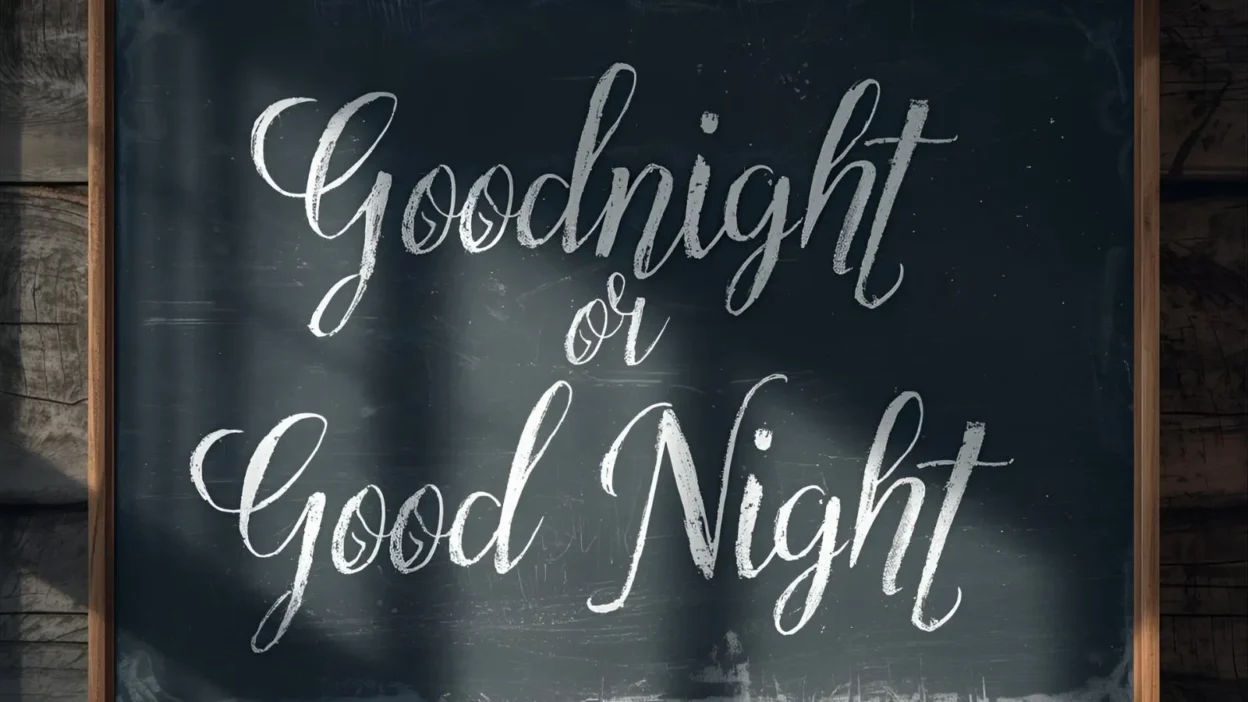Have you ever typed a message and paused, wondering whether to write goodnight or good night? You’re not alone.
Thousands of people search this phrase every month, looking for the correct spelling and proper usage.
While both spellings appear everywhere—in texts, books, and even news headlines—many people are unsure if they mean the same thing.
The confusion comes from changes in English spelling over time, as well as differences between American and British English.
This article will clear up the confusion once and for all.
You’ll learn the quick answer, the origin of the two spellings, how different English styles treat them, and which one you should use in writing.
We’ll also share real-life examples, common mistakes, and Google Trends data to help you decide when to write goodnight and when to use good night.
By the end, you’ll have a simple, clear rule to follow in everyday writing.
Goodnight or Good Night – Quick Answer
The short answer:
- Good night (two words) → Correct in most situations. Example: “Good night, see you tomorrow.”
- Goodnight (one word) → Used informally as a salutation, often in personal notes or poems. Example: “She kissed her child goodnight.”
👉 Rule of thumb: Use good night as a farewell phrase. Use goodnight when it works like an adjective.
The Origin of Goodnight / Good Night
The word good night comes from the Middle English phrase “god night”, a simple farewell wishing someone a pleasant evening rest. Over centuries, English words often fused together, creating compounds. This is how goodnight (one word) appeared.
Linguists note that older forms favored the two-word spelling. Over time, poets and writers began experimenting with the single-word form for stylistic reasons. That’s why today both exist, but the two-word version remains more grammatically standard.
British English vs American English Spelling
English spelling often differs across the Atlantic. With goodnight vs good night, both British and American English accept the two-word form. However:
- In British English, good night is strongly preferred in formal writing.
- In American English, goodnight appears more often in casual speech, bedtime stories, and cultural products (e.g., “Goodnight Moon”).
Comparison Table
| Usage Context | British English | American English |
| Formal writing | Good night | Good night |
| Casual notes/messages | Good night | Goodnight/Good night |
| Literature/Poetry | Both used | Both used |
Which Spelling Should You Use?
- If writing formally (essays, work emails, news): always use good night.
- If writing casually (texts, bedtime stories, social media): both are fine, but good night is safer globally.
- If writing for a British audience: prefer good night.
- If writing for an American audience: either works, but goodnight is common in informal contexts.
- For international/global readers: stick to good night for clarity.
Common Mistakes with Goodnight / Good Night
- ❌ “Goodnight, everyone, and have a safe trip.”
✅ “Good night, everyone, and have a safe trip.” - ❌ “She said good night kiss before leaving.”
✅ “She gave him a goodnight kiss before leaving.”
👉 Tip: If used as a farewell phrase, write good night. If used as an adjective (e.g., goodnight kiss), write goodnight.
Goodnight / Good Night in Everyday Examples
- Emails: “Thank you for your time today. Good night.”
- News headlines: “Fans say good night to a legendary singer.”
- Social media posts: “Goodnight Twitter, see you tomorrow.”
- Formal writing: “He wished his colleagues a good night after the meeting.”
Goodnight or Good Night – Google Trends & Usage Data
Google Trends shows that good night is searched more often worldwide. The two-word form dominates in formal writing, media, and business communication. However, goodnight is popular in the United States, especially in children’s literature and casual messages.
Quick Comparison
| Variant | Popularity Worldwide | Popular in USA | Popular in UK | Usage Context |
| Good night | ✅ Most used | ✅ Common | ✅ Very common | Formal & casual |
| Goodnight | Moderate | ✅ Casual use | Less common | Informal & poetic |
FAQs About Goodnight vs Good Night
1. Is “goodnight” grammatically correct?
Yes, but it’s more informal. Use “good night” in formal writing.
2. Can I use “goodnight” in emails?
Avoid in professional emails. Use “good night” instead.
3. Why does “Goodnight Moon” use one word?
Because children’s literature often favors simpler, stylistic spellings.
4. Do British people say “goodnight”?
They say it in speech, but write “good night” in formal texts.
5. Is there a difference in meaning?
No—the meaning is the same. Only spelling and formality differ.
6. Can “goodnight” be used as an adjective?
Yes. Example: “She read a goodnight story.”
7. Which one should students use in exams?
Always use good night—it’s grammatically safer.
Conclusion
The difference between goodnight and good night is small but important. Both forms are correct, but their usage depends on context. If you’re saying farewell or writing formally, always use good night (two words). If you’re describing something, such as a “goodnight kiss,” the single word works best.
British English strongly prefers the two-word form, while American English allows both, especially in casual use. Globally, “good night” remains the safest option for clear, professional writing.
So next time you text, email, or post online, you’ll know which spelling fits best. Simple rule: good night = farewell, goodnight = adjective or informal style.
Discover More Articles:
- Repass or Repast for Funeral What’s the Correct Term to Use? 2026
- Realised or Realized What’s the Correct Spelling? 2026
- “Like or As Meaning, Difference, and Correct Usage Explained” 2026
- Mama or Momma What’s the Right Spelling and When to Use Each? 2026



